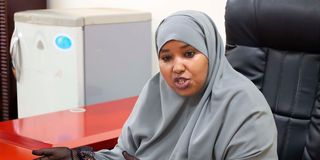Maslaha, a practice condemning GBV survivors to suffering

Garissa County Gender CEC Hawa Abdi Sahal during an interview at her offices in Garissa on December 18, 2023.
What you need to know:
- Under this system, elders and the families of perpetrators and victims reach out-of-court settlements.
- County gender minister says they are finding it difficult to have cases handled by the courts of law.
Maslaha is being blamed for promoting sexual and gender-based violence (SGBV) in Garissa.
Under this system, elders and the families of perpetrators and victims negotiate to reach out-of-court settlements.
Ms Hawa Abdi, the County Executive Committee Member for Gender and Culture, reveals in an interview with Nation.Africa that the system has become the greatest impediment to justice.
“The elders and the clan where the perpetrators come from usually go to the extent of doing fundraisers to raise money used to pay off the victim and her family.”
She terms it disturbing to see many perpetrators roam freely as victims suffer.
Also prevalent is female genital mutilation (FGM). Garrissa is one the 22 FGM hotspot counties.
Ms Abdi says the county is currently formulating an anti- female genital mutilation policy to complement efforts by the national government through the implementation of the Prohibition of Female Genital Mutilation Act, 2011.
“FGM here is a mixture of culture and religion. It is still being done, though secretly. That’s why we are keen to come up with the anti-FGM policy to help tame the menace.”
Zeituni Maalim, the county coordinator for the Collaborative Centre for Gender and Development, says victims of defilement, rape, intimate partner violence and sodomy are suffering in silence. She says few SGBV cases are in court.
Zeituni, also a human rights defender, adds that those campaigning against human rights violations in the area have been facing myriad challenges, including threats.
“In 2021, I was, for example, dealing with a defilement case when I was threatened by the family of the perpetrator while we were in court. I had to hand over the case to someone else for my safety. The case, however, came to a conclusion and the perpetrator was jailed for seven years.”
A survey conducted by Care Kenya indicated the Maslaha system had become an issue of concern to the community, the police and the Judiciary.
Constraint
The system, the survey noted, undermines the judicial system, although the police and the Judiciary were also cited as potential barriers to justice for SGBV survivors.
“The Maslaha system settles disputes through compensation. For survivors of violence, the perpetrator is asked to pay a number of goats (usually about 10) or for replacement clothes (about Sh5,000 to the survivor’s family).
"Punishment for defiling a virgin girl is more severe than that of older or married women; perpetrators are ordered to pay more goats to the families of young survivors or to marry them,” the survey report reads.
Some of the people interviewed in the survey accused the provincial administration, specifically the chief’s office, of working closely with elders to legitimise Maslaha.
Maslaha has been popular with the Somali in solving cases of theft and internal family conflicts. The original purpose was to promote reconciliation between members of the community. It was seen to be cheap as court cases would drag.
The government has in the past warned residents against bypassing the courts on matters of SGBV, child marriage and FGM.
In 2021, Ms Linah Jebii Kilimo, a former Chief Administrative Secretary in the Ministry of Public Service and Gender, warned elders and locals against entertaining the system.
GBV is a criminal offence that violates human rights and should be handled by the judicial system.
“I appeal to the council of elders in this region to engage maslaha courts in other dispute resolutions issues but keep off defilement, early marriage and rampant FGM cases,” Kilimo said at a Garissa hotel during an FGM sensitisation session.
“These should be exclusively handled by law enforcement officers and the courts. The same applies to crimes such as murder, rape, grievous assault.”





